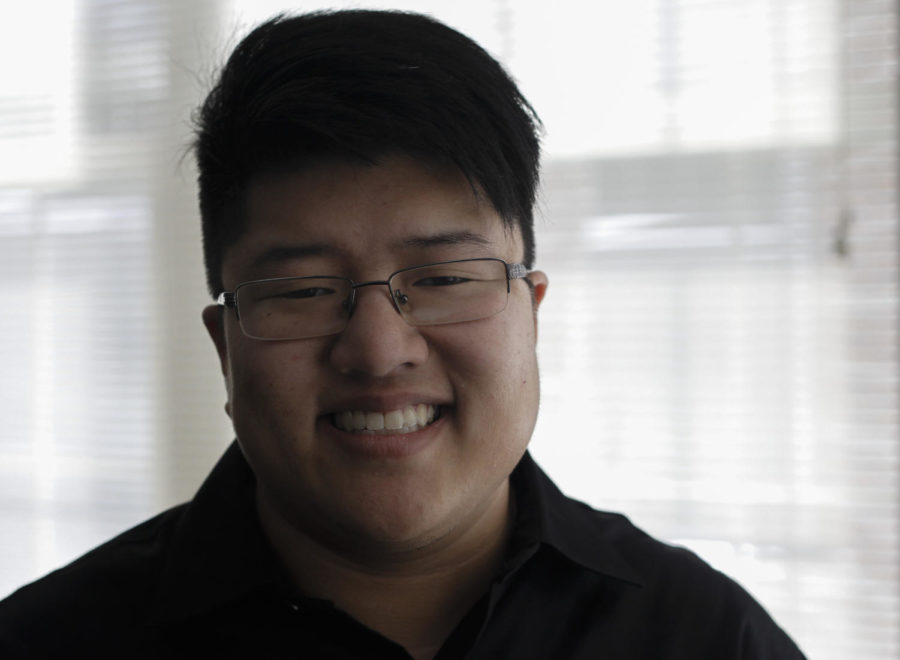What is gender? A transgender student’s perspective
Tiffany Herring/Iowa State Daily
Derrick Moeller, graduate student in education, has made the transition from female to male after a long and hard decision process. In his transition, he found himself surrounded by support from friends and family.
March 10, 2014
Derrick Moeller was on YouTube one night when he decided to look at videos of individuals transitioning from one gender to another. After seeing a visual representation, Moeller was intrigued by the possibility of representing himself as a man instead of a woman.
“People ask me what it’s like to transition, and I think for me, it’s about being a more authentic version of myself,” said Moeller, graduate student in education.
When Moeller decided to transition, it was a natural step because he had a support system where he could ask questions like, “what will this look like for me?”
He said when he was trying to make the decision, he contemplated if it would be enough to continue to be identified as a woman and just be more masculine, or if it would be better for him to transition to a man.
“I realized that for me, what worked best was to start hormone replacement therapy and start testosterone,” Moeller said.
Moeller grew up in Kearney, Mo., a fairly small town. There, he was surrounded by family who loved and supported him through his journey.
He said he always knew he didn’t fit within the box of what it meant to be female or feminine.
Moeller didn’t have the language to describe how he felt.
“It’s so engrained in our society that this is what a man does, and this is what a woman does. It’s really hard to be anything but those two things, especially when you’re a kid,” said Sarah Miller, president of Gamma Rho Lambda, a sorority that supports the Lesbian, Gay, Bisexual, Transgender, Intersex, Queer and Ally community.
The closest word that allowed Moeller to express his masculinity more freely, was the label “tomboy,” so he held onto that throughout his elementary school years.
Moeller didn’t come out to his family as transgender until he was in his 20s.
“It was terrifying to have to come out again around my gender identity,” Moeller said. “I was afraid to lose the relationships I had built prior to transitioning.”
Moeller worked hard at cultivating his support system and was afraid of losing his friends.
After coming out, Moeller realized his fears were mostly unfounded. Everyone was happy for him and valued his friendship.
Moeller said his mother had a dream of what and who her daughter would become, but she had to come to terms with who her daughter is, instead of who she thought her child would be.
They both continue to have conversations around what gender looks like, and what gender expression means for them in their dynamic relationship.
Moeller’s parents grew up in a time where gender identity was not acknowledged or discussed openly.
Joel Geske, associate professor at the Greenlee School of Journalism and Communication, said that people will often confuse gender with sex or sexuality. Geske organizes the Fourth Friday Family, a meal each month to gather LGBT individuals from the central Iowa area.
He said society wants to put us into narrowly defined boxes along sexuality and gender lines, but most of the population fits in between.
“I think having to contemplate what your gender identity and gender expression looks like is a privilege that most folks don’t have to go through,” Moeller said.
Moeller said he thought long and hard about his decision because he doesn’t take things lightly. He worked with mentors and other professionals to help process through what the change would look like for him.
Moeller was motivated most by his continuous strive to move forward in his life. He said he really enjoyed the process of transitioning, and that the process continues, so there’s no end point for him.
“I’ve been lucky to have several people within professional and personal capacities that have supported me thus far in my life journey, and for that I am forever thankful,” Moeller said.
He is happy just to be himself. As for Moeller’s future, he is going to graduate in May with a master’s degree in education.
“I am looking forward to the endless possibilities and opportunities that I have yet to embark upon,” Moeller said.







